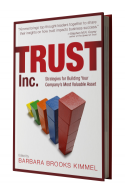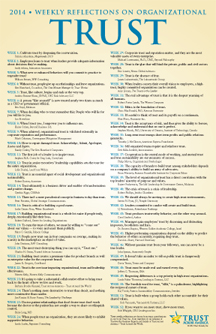If a brand genuinely wants to make a social contribution, it should start with who they are, not what they do. For only when a brand has defined itself and its core values can it identify causes or social responsibility initiatives that are in alignment with its authentic brand story. Simon Mainwaring
We know that trust is built in incremental steps via a holistic approach that begins with leadership voluntarily choosing to make trust a business imperative. In other words, trust and trustworthiness become core values. Many companies, however, choose to view trust through the narrow lens of corporate social responsibility. They measure their good citizenship according to the number of boxes they check on the various independent surveys and standards of “proper behavior,” and then they use the awards and rewards in their messaging to their stakeholders. Sadly a good percentage of these programs in no way reflect the overall health of the company, and fall very short on gauging the trustworthiness of the organization. One need only look at some of the corporate names that rise to the top of annual “Best of CSR” lists to reach the same conclusion.
Over the past ten years much has been written and debated about corporate social responsibility programs and check the box practices:
CSR, The Dangers of Doing the Right Thing
Corporate Social Responsibility: An Overview
At Trust Across America-Trust Around the World, we have been tracking the trustworthiness of almost 2500 public companies over the past five years using our proprietary FACTS Framework. In reviewing the data, what’s often clear is that many of the companies using CSR success as the gold standard of good business are falling far short in other areas of corporate health. Let’s not forget that Enron claimed to have one of the best CSR programs.
Where does CSR end and moral responsibility begin? Does CSR distract the public from asking deeper ethical questions. Does it similarly distract Boards of Directors and C-Suites?
Many claim that any corporate program that “betters” society is good, but not everyone agrees on what is “better” or good. We argue that the betterment of society is not enough. Core values hold the key.
It would behoove leadership to look deeper into trust as a holistic business imperative. Exercising does not ensure good health. Eating well, lowering stress and getting enough sleep are just as important.
Barbara Brooks Kimmel is the Executive Director of Trust Across America-Trust Around the World whose mission is to help organizations build trust. She is also the editor of the award winning TRUST INC. book series. In 2012 Barbara was named “One of 25 Women Changing the World” by Good Business International.
Nominations are now being accepted for Trust Across America-Trust Around the World’s 5th annual Global Top Thought Leaders in Trustworthy Business.
Coming Soon!
Should you wish to communicate directly with Barbara, drop her a note at Barbara@trustacrossamerica.com
Copyright © 2014, Next Decade, Inc.





 AmeriHealth NJ @AmeriHealthNJ
AmeriHealth NJ @AmeriHealthNJ General Motors @GM
General Motors @GM


Recent Comments